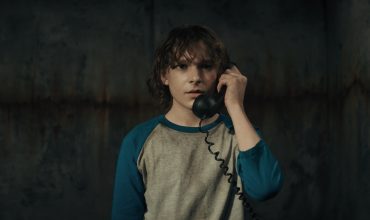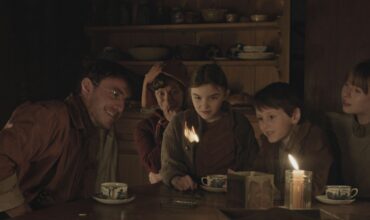When I was 22, I lived rent-free with my mum and worked part time at a low-paying electronics chain store while studying for an Arts degree, spending most of my income on wine and blu rays. In A Thief’s Daughter, 22 year-old protagonist Sara works multiple jobs to support her baby and lives with another young mother in a cramped flat on the outskirts of Barcelona. She is estranged from her mother and her deadbeat father has just gotten out of prison. Her baby daddy doesn’t reciprocate her affections and her kid brother, whom she seeks custody of, seems indifferent towards her. This film made me thankful that I’m not a mother and even more in awe of those who hustle to do it alone.
This is the feature length debut from Belén Funes and stars real life father and daughter Greta and Eduard Fernández as Sara (the Daughter) and Manuel (the Thief.) Greta is excellent as Sara, channeling Bria Vinaite’s Halley in The Florida Project minus the hard exterior and attitude. Sara is both vulnerable and incredibly strong, and there were many moments where I thought to myself “how is she not bursting into tears right now?” Eduard Fernández gives a realistic and layered performance as Manuel, whom I wanted to yell at a lot and then hug immediately afterwards. The film covers only a short stint in their lives but we can infer a lot by what we’re shown in its modest runtime.
What I like most about this film is that it’s hard to villainise anyone (even Manuel). There is no doubt that Sara bears the brunt of the work in raising baby Joel (and trying to raise her brother, Martin) but she does get a lot of help from her neighbours and bosses. Baby daddy Dani may not be interested in her anymore but he’s not the absent father that Sara grew up with(out.) He is hustling too to be able to support the two of them, picking grapes in Lyon for a season and working in his Dad’s business. Manuel, despite his history and flaws, does genuinely seem like he wants to finally show up for his son and displays true remorse for his inability to be there during Sara’s childhood. The sad fact though is that the one person who suffers, despite the apologies and inabilities of the men around her, is Sara.
This suffering is so suppressed in Sara that when she does finally let it out, it only ends in her feeling more stressed and less supported. On several occasions, she picks physical fights with both Dani and Manuel, almost baiting them into hitting her to see if they care enough to expend the effort. But neither of them hit her back, and it’s a weird feeling to be more upset by their apathy than their ability to hurt her.
The relationship between Sara and Manuel is as frustrating and realistic as the best (and worst) of them and they are very much two peas in a fucked-up pod. In one scene at Martin’s communion party Manuel displays problems with alcohol, and when the cleaning up is left to Sara she sniffs at someone’s discarded wine glass before pouring it out onto her hands and playing with the burgundy liquid. We never see her drink in the film despite there being several scenes where people around her are celebrating with wine. She equates alcoholism to parental abandonment as it’s an easy thing to blame, and not drinking puts her a degree further from repeating her father’s behaviour.
Sara tries so hard to distance herself from her father and Dani asks her why she can’t just forget about him and move on. She says “I can’t – I carry him in my face” and it’s such an eloquent way of describing that link we have with our parents and the undesirable traits we inherit from them. Her wording is an interesting comment on the duties of a mother – a life spent carrying someone else until they achieve what they’re meant to achieve, until she’s left alone again.
This is a character study about the effects of abandonment and solitude on a child – Sara didn’t have a proper childhood and is keen not to repeat the cycle for own baby. But as the film goes on, it becomes clear that it’s not Joel or Martin who are at risk of being left alone. “No one calls me” she tells her Dad, before requesting that he pick up the phone once in a while. Whether he does is not part of this story.
The title of this film finally makes sense as the credits roll – Sara is defined by her father’s actions and not by her own merit. She has been robbed of a childhood, an identity and the right to permanent support as a young person, and these are things she will never get back.
Winner of Best New Director at the Goya Awards 2020 and Best New Actress at the San Sebastián International Film Festival 2019, A Thief’s Daughter is playing at the Spanish Film Festival in Perth from April 28 – May 16. I’m not sure if we’ll be able to add ‘going to the cinema’ to our list of permitted activities over the next few days, but keep this one in mind. (7.5/10)
Click here to see the film’s page for the Moro Spanish Film Festival screening across Australia.


